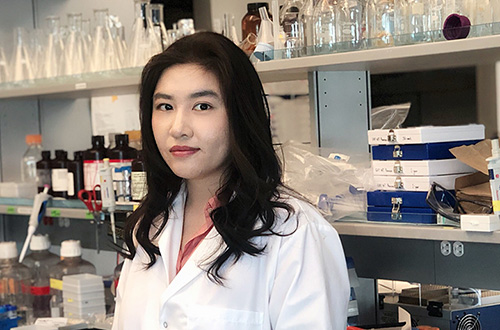UBC scientists have demonstrated for the first time a causal link between high insulin levels and pancreatic cancer.
In a study published today in Cell Metabolism, researchers lowered insulin levels in mice predisposed to developing pancreatic cancer and found that these lower levels protected the mice against developing the disease.

James Johnson, professor, department of cellular and physiological sciences
The findings hold promise for early detection and prevention of pancreatic cancer in humans.
“Pancreatic cancer can be tricky to detect and is too often diagnosed at a late stage, making it one of the deadliest cancers,” said James Johnson, senior co-author of the study, a professor and member of the Diabetes Research Group in the Life Sciences Centre at UBC. “The five-year-survival rate is less than five per cent, and incidences of the disease are increasing alongside obesity.”
Hyperinsulinemia, a condition in which the body produces more insulin than it needs to control blood sugar levels, is increasingly common, found in more than one-third of obese adults, and can be modulated by diet and lifestyle factors.
“The link between hyperinsulinemia has actually been found across multiple cancers, including breast cancer, but pancreatic cancer has the strongest link,” said Janel Kopp, senior co-author and associate professor in the department of cellular and physiological sciences. “Our experiment is the first to directly test that hypothesis, in any cancer, in any animal model.”
Our experiment is the first to directly test that hypothesis, in any cancer, in any animal model.
Janel Kopp
associate professor, department of cellular and physiological sciences
For the study, lead author and PhD student Anni Zhang crossed a strain of mice that is genetically incapable of developing a rise in insulin with a strain of mice predisposed to developing pancreatic cancer. These and the control mice were fed a diet for a year that was known to increase insulin levels and promote pancreatic cancer. At the end of the yearlong study, the mice with slightly reduced insulin levels were shown to be protected from the start of pancreatic cancer.

Anni Zhang, PhD student
“No matter whether you look at the entire pancreas, lesions or tumours, less insulin meant reduced beginnings of cancer in the pancreas,” Johnson said.
“We don’t see a reason why this wouldn’t be generalizable to other cancers,” added Kopp, noting they used the same mutation as 90 per cent of pancreatic cancers in people. “Our mouse models are extremely relevant to people.”
In addition to examining the relationship between insulin levels and other cancers, the scientists would like to investigate whether decreasing excess insulin produced by the body could positively influence later stages of pancreatic cancer. They plan to work with colleagues at BC Cancer on human clinical trials.
The study was funded by a Cancer Research Society grant, an Innovation Grant from the Canadian Cancer Society Research Institute, an Ideas Grant from the Pancreas Centre BC, a Canada Graduate Scholarship and a four-year fellowship from UBC.